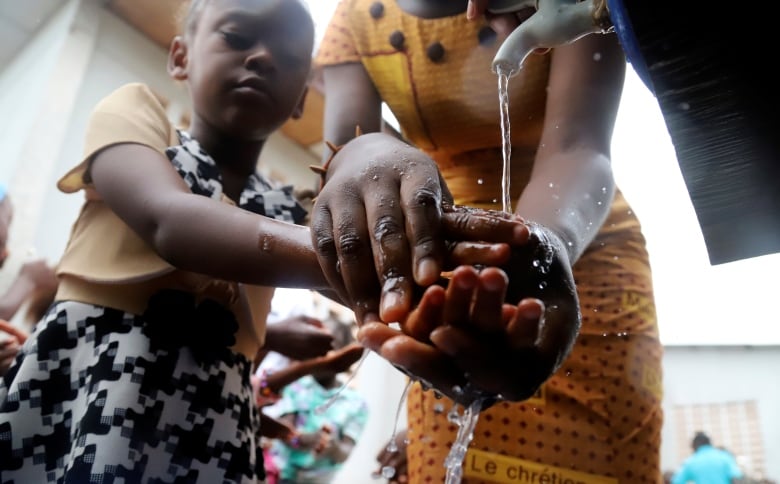Title : Ebola virus: What you need to know about the current outbreak
link : Ebola virus: What you need to know about the current outbreak
Ebola virus: What you need to know about the current outbreak
Ebola is far from new in Congo, but each appearance is still considered a crisis — one that needs to be quickly contained.
This most recent outbreak of the hemorrhagic fever, the ninth in Congo since the disease was identified in the 1970s, was first labelled an outbreak on May 8.
The disease can move from infected animals to humans who come into contact with contaminated blood. Ebola virus isn't airborne; instead, it moves from one person to another through contact with infected bodily fluids.
For people who contract Ebola, which has an incubation period of between two and 21 days, the fatality rate is high.
The latest numbers bear that out.
A summary from the World Health Organization issued on May 21 put the number of Ebola patients (including confirmed, probable and suspected cases) at 58 and the number of deaths at 27 — a fatality rate of 46.5 per cent.
Where did it start and how far has it spread?
The current outbreak began in Bikoro, a small lakefront community in a rural area of Equateur province.
By mid-May, numbers were up and concern was mounting: cases of Ebola had been confirmed in Mbandaka, a sprawling city of more than a million people close to the Congo River.
The river is a lifeline, essential for moving people and products through a massive country with weak infrastructure. But the river's role in daily life also raises the alarm for some health officials, since Congo's capital Kinshasa is downriver from Mbandaka.
Health officials don't want to see the disease in Kinshasa. If the virus is confirmed in the densely packed city of more than 10 million, health teams will have to make a major push to find every case and curb Ebola's ability to spread.
Local and international groups are also taking steps to make sure the virus doesn't cross borders. A WHO spokesperson said teams have been deployed to increase surveillance along the Congo River and at other points of entry.
We are doing everything we can to stop <a href="https://twitter.com/hashtag/Ebola?src=hash&ref_src=twsrc%5Etfw">#Ebola</a> from spreading across borders, and to be prepared if it does. Yesterday we met with countries neighbouring <a href="https://twitter.com/hashtag/DRC?src=hash&ref_src=twsrc%5Etfw">#DRC</a> at <a href="https://twitter.com/hashtag/WHA71?src=hash&ref_src=twsrc%5Etfw">#WHA71</a>. Nine countries have been advised they're at high risk, and preparedness activities are underway. <a href="https://t.co/1rHTrRv3HK">pic.twitter.com/1rHTrRv3HK</a>
—@DrTedros
What's being done to contain the outbreak?
Dr. Oly Ilunga, Congo's minister of health, said every local expert and resource available have been deployed to deal with the Ebola outbreak. But Congo's health system, once regarded as exemplary, has struggled after being starved for funding and support amid years of conflict.
This means every outbreak requires both local effort and substantial international support, and already there are concerns that not enough money has been pledged to meet the need.

WHO says the Ebola strategic response plan needs $56.8 million US. The funding so far is well short of that goal, but has been bolstered by a $12-million pledge from the World Bank's new pandemic emergency financing branch, which is meant to swiftly move money into areas facing an outbreak.
On May 18, WHO said this outbreak isn't an international public health emergency, but officials said there was still a need for a "vigorous" response on the ground.
Supplies and staff are being sent to Congo, and organizations like Doctors Without Borders have already established isolation zones in treatment centres in Bikoro and Mbandaka.
Is there a cure?
There's no known cure for Ebola, which means doctors and nurses are left to do what they can to treat the symptoms. But there is a potential vaccine, and it's being tested in Congo right now.
The Congolese government, with help from WHO and other partners, is testing the rVSV-ZEBOV Ebola vaccine. Canadian funding and work at the National Microbiology Laboratory in Winnipeg were essential to developing the vaccine, which is not yet licensed but has shown promise in clinical trials.
So far, front-line health-care workers have been vaccinated, as have family members and others who have had close contact with Ebola patients.
Dr. Peter Salama, deputy director general for Emergency Preparedness and Response of the World Health Organization, told CBC's As It Happens that the ring vaccination method "was used in a trial a couple of years ago in Guinea to demonstrate that this vaccine, used with that strategy, can be 100 per cent effective."
The pharmaceutical giant Merck has a licensing agreement to develop the vaccine. If it works as researchers hope it will, Merck told CBC News in a statement, it will "make the vaccine available to the world's poorest countries at the lowest possible, not-for-profit price."

Thus Article Ebola virus: What you need to know about the current outbreak
You are now reading the article Ebola virus: What you need to know about the current outbreak with the link address https://coneknews.blogspot.com/2018/05/ebola-virus-what-you-need-to-know-about.html


0 Response to "Ebola virus: What you need to know about the current outbreak"
Post a Comment